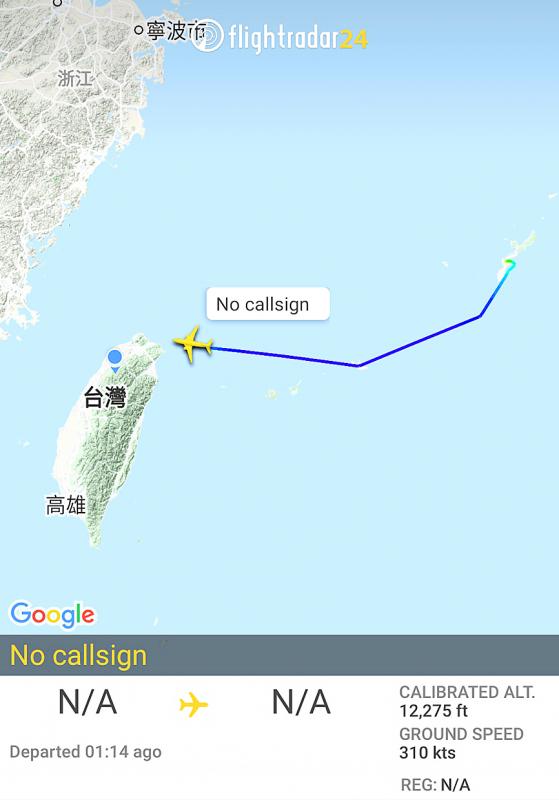A US military transport plane made a brief stopover yesterday morning in Taipei, drawing media attention and no comment from the American Institute in Taiwan (AIT) or the Ministry of Foreign Affairs.
A C-146A Wolfhound touched down at Taipei International Airport (Songshan airport) at 9:32am after flying from Kadena Air Force Base in Okinawa, Japan, Television Broadcasts Satellite (TVBS) reported.
Apart from regular landing procedures handled by the airport, the air force said that it had no contact with the aircraft.

Photo: Screen grab from Twitter
It was reportedly carrying a package for newly installed AIT Director Sandra Oudkirk, who is undergoing a 14-day quarantine after arriving in Taiwan on Monday, TVBS said.
Originally scheduled to stay for one hour, the plane departed 24 minutes early at 10:06am after delivering the package, it reported.
The US Air Force says that the C-146A Wolfhound is a modified version of the Dornier 328 commuter airliner used mostly to transport small teams and cargo for the US Special Operations Command.
Chinese Ministry of National Defense spokesman Colonel Wu Qian (吳謙) expressed “grave concern” over the visit, saying that any foreign military aircraft landing on Chinese territory must be approved by the People’s Republic of China.
The US must cease playing with fire, as it would only draw Taiwan into a dangerous situation, Wu said in a statement on the ministry’s Web site.
“The Chinese People’s Liberation Army is on high alert and will take all necessary measures to resolutely crush any designs on ‘Taiwanese independence,’” he added.
China’s Taiwan Affairs Office (TAO) spokeswoman Zhu Fenglian (朱鳳蓮) urged the US to abide by the Three Joint Communiques and stop further provocative action.
Democratic Progressive Party Legislator Wang Ting-yu (王定宇), who serves on the legislature’s National Defense and Foreign Affairs Committee, confirmed the visit on Facebook, but declined to comment on its intent.
Regardless of what the aircraft came to do, its significance lies in the fact of its arrival, Wang said.
How the US interacts with Taiwan “is our business,” he said.
“No one else has the right to intervene,” Wang added.

A magnitude 5.6 earthquake struck off the coast of Yilan County at 12:37pm today, with clear shaking felt across much of northern Taiwan. There were no immediate reports of damage. The epicenter of the quake was 16.9km east-southeast of Yilan County Hall offshore at a depth of 66.8km, Central Weather Administration (CWA) data showed. The maximum intensity registered at a 4 in Yilan County’s Nanao Township (南澳) on Taiwan’s seven-tier scale. Other parts of Yilan, as well as certain areas of Hualien County, Taipei, New Taipei City, Taoyuan, Hsinchu County, Taichung and Miaoli County, recorded intensities of 3. Residents of Yilan County and Taipei received

Taiwan has secured another breakthrough in fruit exports, with jujubes, dragon fruit and lychees approved for shipment to the EU, the Ministry of Agriculture said yesterday. The Animal and Plant Health Inspection Agency on Thursday received formal notification of the approval from the EU, the ministry said, adding that the decision was expected to expand Taiwanese fruit producers’ access to high-end European markets. Taiwan exported 126 tonnes of lychees last year, valued at US$1.48 million, with Japan accounting for 102 tonnes. Other export destinations included New Zealand, Hong Kong, the US and Australia, ministry data showed. Jujube exports totaled 103 tonnes, valued at

TRUST: The KMT said it respected the US’ timing and considerations, and hoped it would continue to honor its commitments to helping Taiwan bolster its defenses and deterrence US President Donald Trump is delaying a multibillion-dollar arms sale to Taiwan to ensure his visit to Beijing is successful, a New York Times report said. The weapons sales package has stalled in the US Department of State, the report said, citing US officials it did not identify. The White House has told agencies not to push forward ahead of Trump’s meeting with Chinese President Xi Jinping (習近平), it said. The two last month held a phone call to discuss trade and geopolitical flashpoints ahead of the summit. Xi raised the Taiwan issue and urged the US to handle arms sales to

BIG SPENDERS: Foreign investors bought the most Taiwan equities since 2005, signaling confidence that an AI boom would continue to benefit chipmakers Taiwan Semiconductor Manufacturing Co’s (TSMC, 台積電) market capitalization swelled to US$2 trillion for the first time following a 4.25 percent rally in its American depositary receipts (ADR) overnight, putting the world’s biggest contract chipmaker sixth on the list of the world’s biggest companies by market capitalization, just behind Amazon.com Inc. The site CompaniesMarketcap.com ranked TSMC ahead of Saudi Aramco and Meta Platforms Inc. The Taiwanese company’s ADRs on Tuesday surged to US$385.75 on the New York Stock Exchange, as strong demand for artificial intelligence (AI) applications led to chip supply constraints and boost revenue growth to record-breaking levels. Each TSMC ADR represents